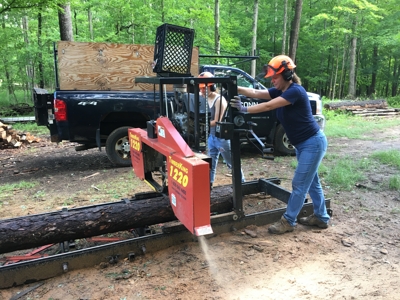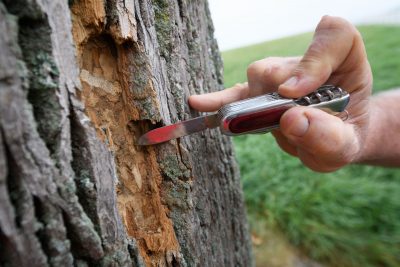Consulting Foresters
are private independent professionals who earn their living managing forestland for woodland owners. They also serve as the landowner's representative in marking, tallying and marketing timber and other forest products. Most offer a full range of forest and wildlife management services. They charge for their services, either on a per diem basis or as a percentage of gross income received for wood products sales which they oversee. If you are thinking of having a management plan made or having any work done in your forest, you can get great information by talking to a forester.
In Connecticut there are 3 levels of licensing for forestry professionals. The levels are defined by what they are allowed to do and not allowed to do for a landowner:
- A certified forest products harvester may participate in the execution of commercial forest products harvest operations. According to the Forest Practices Act, a certified forest products harvester cannot represent him or herself as a forester or a supervising forest products harvester, solicit the purchase of commercial forest products, execute the contracts or agreements, either written or oral, for the purchase of commercial forest products, Act in the buyer's behalf in the supervision of a commercial forest products harvest operation, or in the purchase of commercial forest products, Mark trees, or represent the landowner as agent in the sale of commercial forest products.
- A certified supervising forest products harvester may solicit the purchase of commercial forest products, execute oral or written contracts and agreements for the purchase of commercial forest products, act in the buyer's behalf in the supervision of commercial forest product harvest operations, mark trees as a means of clearly designating which are to be cut and which are to be left uncut, may complete notification forms, and may discuss with the landowner and make recommendations concerning techniques and procedures applied to timber harvesting. Included in this would be such items as measures for erosion control, the location and installation of skid trails, haul roads, stream crossings, filter strips and sedimentation barriers, and techniques for felling and skidding trees. According to the Forest Practices Act, a certified supervising forest products harvester cannot represent himself or herself as a forester, participate in the preparation of cutting plans or forest management plans, either oral or written, without the supervision of a certified forester, represent the landowner as his or her agent in the sale of forest products, or make recommendations to a landowner concerning silvicultural principles and techniques.
- A certified forester may plan or design forest practices, including but not limited to forest management plans and cutting plans, represent the landowner as his or her agent in the sale of commercial forest products, solicit the purchase of commercial forest products, execute written or oral contracts and agreements for the purchase of commercial forest products, and participate in the execution of commercial forest product harvest operations
Special certifications are associated with assessing forest land for PA-490 Current Use tax regulations, creating Audubon-Society-Approved bird habitat, and other programs.
The directory of licensed foresters for CT can be found at the bottom of this DEEP Forestry Division Page about Forester Certification.
The directory of licensed foresters for CT as well as other resources to help landowners connect with a forester can be found on this CT Forest and Park Association page.
While we at UConn do not endorse any particular forestry operation, we suggest you google "consulting foresters in CT" and take the time to interview foresters to see if they have experience making plans or running operations that would fit with your forest and your plans.
Industrial Foresters
work for a wood using industry, usually a sawmill. Most offer professional marketing services if you sell your timber to their employer; a few offer comprehensive management services as well. The cost of their services is usually not charged directly to the landowner, but incorporated into the price received for the timber purchased. Visit the CT Professional Timber Producers Association website.
Service Foresters
are CT DEEP Forestry Division skilled professional employees and CT-Certified Foresters that can visit individual properties at no cost to the land owner. They can provide Connecticut woodland owners with professional planning and technical forestry assistance. CT Service Foresters, and the regions they serve, can be found on this DEEP Forestry Division page.

